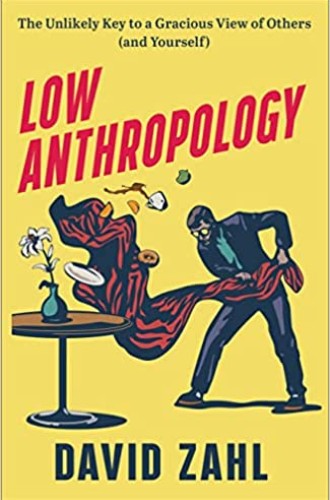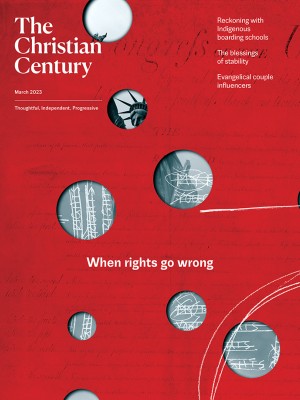The theological anthropologies implicit in our politics
David Zahl maps the conservative/liberal binary according to distinctions between high and low anthropologies.
You might call me a low anthropologist. Steeped in a Lutheran theological heritage, I have been shaped by Martin Luther’s dictum that a theologian of the cross calls a thing what it actually is. We Christians should not shy away from naming the fragility, finitude, and contingency of human life. We are broken, sinful creatures from beginning to end, completely unable to earn our way into God’s good graces, and it is only by divine grace, as God’s freely given gift, that we are finally saved from ourselves. This awareness led Luther to his depiction of the human subject as simultaneously saint and sinner. As a lifelong Lutheran, I have found that this insight holds explanatory power for making sense of the human situation. If nothing else, I have found it to be an accurate description of my own lived experience.
Perhaps this is why I find much to commend in David Zahl’s newest work. Zahl argues that we are limited, doubled, self-centered creatures who spend far too much of our lives trying to evade this reality. We ignore our limitations, pretending that we are capable of far more than the constraints of time, biology, and historical context will allow. We minimize our doubleness, failing to perceive that our lives are governed by a jumbled mix of motivations that leads to an impasse between what we say we want and what we actually do. We explain away our self-centeredness, failing to see our own shortcomings while being quick to point out other people’s flaws.
Read our latest issue or browse back issues.
Of course, these are not just religious phenomena; these types of behaviors characterize all spheres of life. Surely it does not take much imagination to see these impulses at work in the political sphere, for example. But there is grace to be found through an honest acceptance of these realities. We discover new opportunities for humility, unity, community, courtesy, humor, and compassion when we view our lives and the lives of others through such an honest lens. At this moment of extreme polarization in the United States, such fruits are welcome.
Zahl does an exceptional job of conveying difficult truths with grace and humor. His writing evinces a pastoral heart. His claims are made even more compelling by the wealth of anecdotes that he provides, drawing widely from both scholarly publications and popular culture to illustrate his points. On several occasions, I found myself stopping to check out links cited in the footnotes, which led me to some delightful YouTube rabbit holes. If Zahl is correct—and I think he is—the contemporary culture of the United States needs this kind of refreshing honesty more than ever.
To that end, I found his analysis of the anthropologies implicit in US politics to be especially insightful. As Zahl shows, all political persuasions operate with an implicit anthropology. A good portion of the conservative/liberal binary can be mapped by attending to the distinctions between high and low anthropologies. To be clear, it is not that either the Democratic or the Republican party swings consistently high or low in their views; rather, each party is selectively high and low. Even these selective biases can shift depending on the issue at hand and who is currently in power.
For instance, on the side of low anthropological takes, progressives generally like to emphasize limitation (particularly at a systemic level) while conservatives like to emphasize self-centeredness (particularly at the personal level). Accordingly, each party has its own recipe for how to address the shortcomings of our corporate life. But perhaps most tellingly, neither party seems too interested in talking about doubleness. Both parties believe that we are fundamentally in control of our destiny and could fix all our problems if only we could enact the right set of laws and policies.
While my Lutheran proclivities find much here to commend, perhaps they are also why I have some concerns about Zahl’s framing of theological anthropology. To be blunt, I am not sure that what he presents is actually a low anthropology. I can think of anthropologies that are far lower, particularly the variety that emphasize the total depravity of the human subject, which is not what Zahl promotes.
More than anything, Zahl’s anthropology strikes me as a realistic one. He is realistic about the limitation, doubleness, and self-centeredness that characterize human life, yet he is also realistic about the flourishing that can come through acceptance of this reality (on the part of both oneself and others). By calling this a low anthropology, I worry that he diminishes our responsibility to address human limitation, doubleness, and self-centeredness. Instead of responsibility, we are left with resignation. In turn, we may never experience the saintly dimension of human life that Luther also talked about.
To be clear, I do not think that Zahl is trying to let people off the hook, and I materially agree with his analysis of human limitation, doubleness, and self-centeredness. I do wonder, though, if Zahl’s project would be better served if it were reframed as realistic anthropology. No doubt we are fragile beings whose lives are marked by brokenness from beginning to end, yet there is a deep beauty both within and apart from this brokenness. At every moment, our lives are an intermingling of beauty and brokenness; you might say that beauty and brokenness are two sides of the same human coin. Might a realistic anthropology that holds together both beauty and brokenness better serve the goal of human flourishing? Such a tension might prompt moral reflection upon the responsibility that humans carry to bring this beauty to bear upon the brokenness of the world.
Still, there is much honest, redemptive truth contained within these pages, and I can enthusiastically recommend this book as a springboard for personal and communal reflection.






